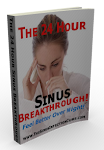Does the pain worsen when you bend forward, lie down or whenever you blow your nose?
Then, this might be symptoms of a sinus headache.
A sinus headache is a headache that occurs when the sinuses become congested. The sinuses are the bony, air-filled cavities in the head that connect to the nose through small openings. During a cold or allergy attack, the openings can become blocked by excess mucus and may become infected.
Diagnosis
The key to getting rid of a sinus headache is proper diagnosis. In some cases, a sinus headache may actually be a migraine headache. It is important to distinguish between the two, because treatment for each type of headache will vary.
If you do not have a true sinus headache and take decongestants, for example, they could make your headache worse.
To diagnose a sinus headache, a doctor will need to check the patient's medical history and perform a physical examination. If sinusitis is suspected, the doctor may confirm diagnosis with an x-ray or a CT scan. These tests can show if there is swelling or fluid in the sinus tissue.
It is important that a sinus infection is treated, because over time the infection can spread to the brain or to the membranes covering the brain, so be sure to give your doctor as much information as possible if you think you have sinus headache symptoms.
Treatment and Medication
If you have a true sinus headache, your doctor may recommend over-the-counter medicines such as: aspirin, acetaminophen, or ibuprofen to temporarily relieve pain. Decongestants may also be prescribed if the sinuses are blocked.
Once sinusitis is detected, the doctor may also prescribe antibiotics to eradicate the germs causing the infection. In addition, antihistamines are given if allergies are the cause of sinusitis.
It may help to drink plenty of fluids as well and inhaling steam 2 to 4 times a day.
Head stretches and relaxation techniques may also help relieve and prevent headaches.
As the sinus infection clears up, the headache should also disappear.
A sinus headache should be relieved by medication in about three to five days. If you still have headache and it is accompanied by fever of 38.9 degrees C, nose bleeding, swelling over the forehead, eyes, nose or cheek, blurred or double vision, you should see your doctor again.
Prevention
- To reduce the risk of sinusitis, keep your sinuses healthy.
- Wash your hands often with soap and water.
- Take a yearly flu vaccine.
- Avoid irritants such as cigarettes and other air pollutants.
- Use a humidifier to add moisture to dry indoor air.
There are also several food supplements that may help prevent or treat sinus headaches because they either diminish sinus inflammation or help to ward colds which, in turn, make it less likely for you to get sinusitis.
- Lactobacillus and other probiotics (friendly bacteria)
- Vitamin C
- Zinc
- Garlic
Learn to listen to your body and make the proper adjustments in lifestyles and taking the necessary preventive measures to keep your head and sinuses ache free.
